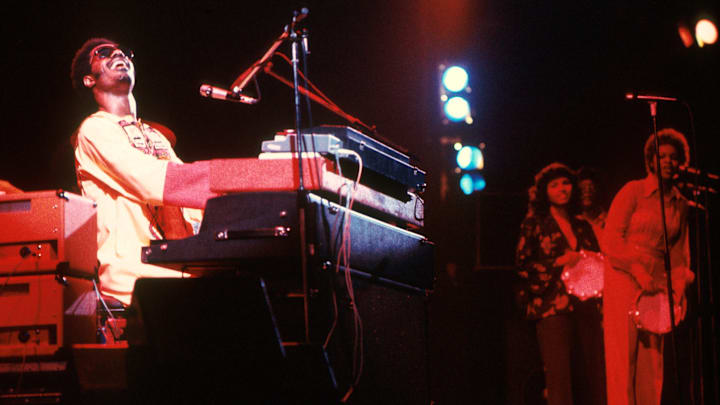1974 may not have been the greatest year in modern pop music history, but it just may have been the most eclectic. Consider this.
At the 17th annual Grammy Awards in 1975, recognizing 1974 releases, the Best Country Performance by a Duo or Group went to the Pointer Sisters. This was fifty years before Cowboy Carter. Elvis Presley took home the award for Best Inspirational Performance. Record and Song of the Year went to two different sentimental ballads by Olivia Newton-John and Barbra Streisand respectively while Album of Year took a hard turn into the progressive funk of Stevie Wonder’s Fulfillingness’ First Finale.
On the Billboard Hot 100, 35 different songs occupied the top position. I haven’t done the research, but that has to be close to a record. No one artist or one genre dominated. In successive weeks, the maudlin claptrap of Paul Anka’s “Having My Baby” gave way to Eric Clapton’s Bob Marley cover “I Shot the Sheriff.” Over a different two-week span, “Rock the Boat” ceded the top spot to “Rock Your Baby.” And toward the end of the year, “You Haven’t Done Nothing” was replaced by “You Ain’t Seen Nothing Yet.”
20 fantastic albums turning 50 in 2024
There were instrumentals at the top. There were a couple of novelty songs. There was rock and pop and soul. Three of the four ex-Beatles hit number one. (Sorry George.) There was even a song that began with the iconic lyric “Ooga-chaka, ooga ooga, Ooga-chaka ooga ooga.”
We may not have recognized it at the time, but 1974 was something of a conglomeration of pop music’s past and future, waiting for one or two genres to seize the public’s imagination. Rock & roll was still a force, but it was showing signs of age. It was splintering into a million subgenres – prog and metal and punk and funk, each of which would develop on its own course over the ensuing decades. Outlaw country was declaring war on Nashville, while up in the Bronx, some enterprising kids were starting to chop up old records, and in the process, literally changing the world.
A couple of years later, disco and arena rock would rise to dominance but their reigns would be short-lived. They were nothing more than popular dead ends. But in 1974, that was still a little ways off. Popular music – perhaps for the last time in modern history – was the wild, wild west. Anything was possible.
Our countdown of twenty great 1974 LPs reflects that diversity. We’ll have multiple genres. We’ll have the popular and the obscure – the revered and the forgotten. The only requirements are that they are albums released in 1974 – and they are filled with outstanding music.
20. Exotic Birds and Fruit by Procol Harum
The great orchestral prog rock band Procol Harum had seemed to be slipping a bit in the early ‘70s. But they made a rousing return to form with Exotic Birds and Fruit, which recalled the glory days of “Whiter Shade of Pale” and A Salty Dog. Gary Brooker’s blues vocals were as strong as ever, and the band was coming to terms with the departure of its two dominant musical voices – organist Matthew Fisher (who had left several years earlier) and guitarist Robin Trower (who had departed after the previous album).
Organist Chris Copping slipped seamlessly into Fisher’s shoes, and even though Mick Grabham didn’t really match Trower’s prowess, the songs were strong and the baroque blending of classical and rock was back in full gear. Brooker really shines on “Butterfly Boys,” both with his voice and through his piano.
19. Bad Company by Bad Company
They were one of the first supergroups to really make a go of it. This wasn’t simply a one-off or side project. Vocalist Paul Rodgers and drummer Simon Kirke came from Free. Mick Ralphs brought his guitar from Mott the Hoople. And Boz Burrell had already played bass with pretty much everybody.
Rodgers and Ralphs, either separately or in tandem, wrote most of the material, and it rocked in the way that fans and music critics hoped it would. Rodgers kicked it off by belting out “Can’t Get Enough,” and it was all systems go from there. The original lineup would release six more albums over the next decade before fracturing, but none was as cohesive and consistent as the 1974 debut.
